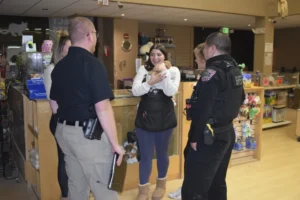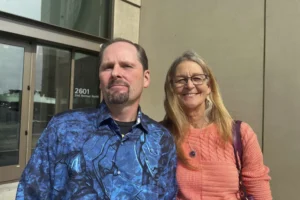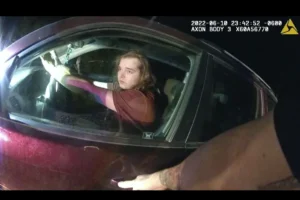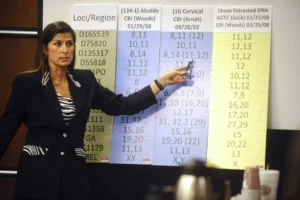State Lets Deadline Pass to Challenge Wyoming Supreme Court Ruling
Lawyers say they hope decision in traffic-stop case will help prevent unreasonable searches
- Published In: Criminal Justice
- Last Updated: May 09, 2022

The Wyoming Supreme Court found a traffic stop by a highway patrol officer was unreasonable and violated the constitutional rights of a passenger in a car traveling on an interstate in southeastern Wyoming. (Courtesy photo)
By Shen Wu Tan
Special to the Wyoming Truth
The state attorney general has opted not to challenge a recent Wyoming Supreme Court ruling that found a traffic stop by a highway patrol officer was unreasonable and violated the constitutional rights of a passenger in a car traveling on an interstate in Cheyenne.
The state had 15 days to challenge the justices’ decision last month in which they said the district court erred in the case. With the state’s inaction last week, the Wyoming Supreme Court mandated the District Court of Laramie County to reverse its decision to not suppress evidence of marijuana discovered during the traffic stop.
The ruling handed down by the state high court is believed to be the first time where a Wyoming court considered a trooper’s own conduct prior to a traffic stop in determining if a stop was reasonable, according to Devon Petersen, who represented the defendant, Joshua David Levenson. Petersen said before this case, it hadn’t been clear if an officer’s conduct could be taken into account.
“The only question was, was there a traffic violation or not, and if there is a traffic violation, then you could stop somebody,” said Petersen of Fleener Petersen, a partner of Tom Fleener, who is the general counsel of the Wyoming Truth. “But what this case does is, it makes the officer’s conduct prior to the stop, prior to even observing the traffic violation, relevant. That has potentially huge potential implications for traffic stops and kind of reining those in.”
He added, “It’s my hope that this case will contribute to the end of traffic stops for minor traffic violations.”
Former prosecutor and Natrona County District Attorney Michael Blonigen said he does not believe the ruling will curb stops for minor traffic violations. “However, the officers will observe and not provoke the traffic violation,” Blonigen said. “I think this case was based on specific and unusual facts not present most of the time.”
On Aug. 28, 2018, Trooper Shane Carraher was monitoring traffic on Interstate 80. When the trooper first saw the Nissan Rogue, a rental car from Santa Rosa, California, in which Levenson was riding as a passenger, the officer didn’t notice any traffic violation. But he decided to follow the Nissan, speeding at 111 miles per hour at one point in a 75-mile-per-hour zone to catch up with the Nissan, court documents say.
The trooper reduced his speed to about 54 mph and positioned his patrol car slightly behind the Nissan’s rear bumper when he determined the Nissan was following too closely behind the semi-truck. After he pulled over the Nissan, the trooper decided to have a drug-detection dog search the car and discovered 42 pounds of marijuana.
Levenson was charged with felony intent to deliver a controlled substance and felony possession of a controlled substance. He entered a conditional guilty plea to possession of marijuana, and the state dismissed the felony intent to deliver charge in exchange for his guilty plea. Levenson reserved his right to challenge the rejection of his motion to suppress evidence from the search of the vehicle during the traffic stop.
There are numerous occasions where traffic stops for minor violations “turn bad” and are “ripe for abuse,” Petersen said. A pretextual traffic stop occurs when a police officer stops a vehicle to investigate a possible crime unrelated to violations of rules of the road.

Petersen said that while Levenson is not a person of color, Petersen believes Trooper Carraher conducted a pretextual stop; there was no finding by the court and no admission by the patrolman that it was pretextual.
“But why else chase down at 111 mph a car committing no traffic violations other than to set up a search for drugs based on a hunch?” he asked. “It is my hope this case will discourage law enforcement from similar conduct in the future.”
Crystal Stewart, an attorney with Pence & MacMillan who also serves as a member-at-large of the Wyoming State Bar’s criminal justice section, agreed that the traffic stop by the trooper was likely pretextual.
Stewart noted pretextual stops are “technically legal” as long as officers are able to say they observed a traffic violation. She said in a lot of her cases, pretextual stops occurred when drivers had out-of-state plates, a rental car or a vehicle with dark-tinted windows.
“I think officers will find any reason to pull those vehicles over with the intent to search,” Stewart said. “To me, it is apparent that these vehicles are being targeted, but I can’t say that for certain because I don’t know how many people with Wyoming plates get pulled over. I just know that nearly everyone who calls me who has been pulled over, they have out-of-state plates and what they were pulled over for is a very minor, minor traffic infraction.”
She added, “I think it’s a huge, huge problem in Wyoming. I don’t think a lot of people recognize how serious this is that we have law enforcement officers on a regular basis stopping people with the intent of searching the vehicle and finding drugs and then just using these little minor traffic infractions to do that. I don’t think it’s fair and I don’t think it’s right…and I hope that we have more rulings that are similar to this or more opinions that establish laws that these pretextual stops really aren’t appropriate.”
In January 2019, Levenson asked the District Court of Laramie County not to allow the marijuana to be admitted as evidence, arguing the seizure was unreasonable and unconstitutional because the officer’s actions created circumstances that led to the traffic violation and stop.
The district court denied his request, finding the stop justified because of an observed traffic violation and declining to consider the officer’s conduct. Levenson appealed to the state Supreme Court.
The district court sentenced Levenson to 12-15 months behind bars but released him on bond while waiting for resolution of his appeal.
“The Wyoming Constitution requires searches and seizures be reasonable under all the circumstances,” the justices wrote in their ruling on April 20. “Similarly, the Fourth Amendment requires us to employ an objective standard which considers the totality of the circumstances. Both the Wyoming Constitution and Fourth Amendment reject the adoption of any bright-line rule and instead require a fact-specific reasonableness inquiry, which includes objectively analyzing the officer’s conduct to determine if he was justified when he initiated the stop. We find the traffic violation for following too closely was not objectively justified and was unreasonable at its inception.”
The justices went on to write that the district court was wrong in denying Levenson’s motion to suppress evidence and reversed the lower court’s decision.
Wyoming Attorney General Bridget Hill, who represented the state in the case, did not reply to multiple requests for comments about the Wyoming Supreme Court’s ruling.
Blonigen, the former prosecutor and Natrona County District Attorney, said the Wyoming Supreme Court justices found the trooper’s actions essentially caused the traffic violation for which Levenson was pulled over.
“You can’t cause a traffic violation and then pull the person over,” he said. “There is a difference between actively causing a violation rather than passively observing it.”
Blonigen added the vehicle was compelled by the officer’s conduct to pull in behind the semi, noting the court was likely bothered by the trooper’s “pretty aggressive” actions.
“The opinion didn’t end all traffic stops for minor traffic violations,” Petersen said. “But there seems to be a national movement either to do away with pretextual stops … and then there’s other states that are legislatively saying cops don’t have the authority to pull someone over for not using their left lane signal or not maintaining a single lane of travel or expired tags.”
Petersen added, “I think it’s an important case and an important step toward curbing arbitrary police power.”













